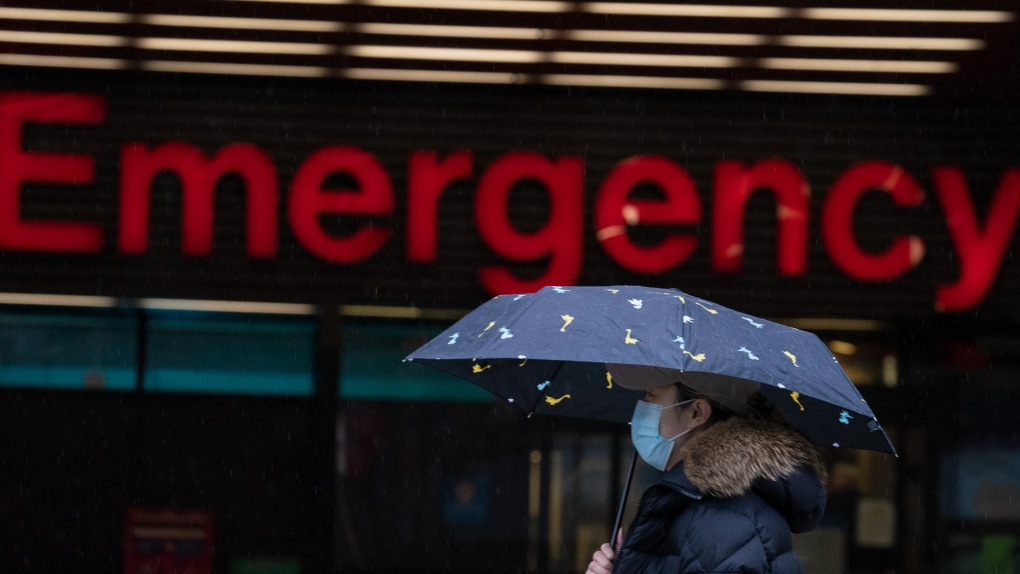Interior, Island and North led B.C.'s decline in COVID-19 hospitalizations this week
 A person wears a protective face covering to help prevent the spread of COVID-19 while walking past the emergency entrance of Vancouver General Hospital in Vancouver, B.C., Friday, April 9, 2021. THE CANADIAN PRESS/Jonathan Hayward
A person wears a protective face covering to help prevent the spread of COVID-19 while walking past the emergency entrance of Vancouver General Hospital in Vancouver, B.C., Friday, April 9, 2021. THE CANADIAN PRESS/Jonathan Hayward
The number of COVID-19 patients in B.C. hospitals hit its lowest point in more than a month this week, and the decline was driven largely by regions outside the Lower Mainland.
The total number of test-positive patients in hospital declined from 540 last week to 473 on Thursday, but in the Vancouver Coastal Health region, it barely changed at all.
VCH's hospital census actually increased from 107 patients last week to 109 this week.
Fraser Health – which is B.C.'s most populous health authority has the highest number of COVID-19 patients – saw a modest decline, from 234 to 226.
The three other regional health authorities each saw much larger declines in hospitalized patients, particularly given their smaller populations.
Interior Health saw its patient-count decline by 25, from 87 patients in hospital last week to 62 on Thursday.
Island Health's total dropped by 22, from 77 to 55, and Northern Health's dropped by 12, from 23 to 11.
All of these figures reflect "hospital census" totals, meaning they include everyone in hospital who has tested positive for COVID-19, even if the disease was not the reason for admission.
The regional totals don't add up to the overall total of 473 because COVID-19 patients in Provincial Health Services Authority facilities are not reported by region on the B.C. Centre for Disease Control's COVID-19 dashboard. The regional totals add up to 463, implying that there were 10 COVID-19 patients in PHSA facilities as of Thursday.
Hospitalizations and lab-confirmed cases of COVID-19 have been declining in recent weeks as the sixth wave of the pandemic recedes.
Because B.C. only offers PCR testing to people with COVID-19 symptoms in specific and limited situations – and does not collect data on rapid antigen test results – the true number of new infections in the province each week cannot be known.
The province continues to report the results of PCR tests by region, however, and the latest map of lab-confirmed infections from the BCCDC underscores the declining case count.
Only one local health area – Surrey – saw more than 100 new lab-confirmed cases during the week of May 15 to 21.
The City of Vancouver is subdivided into six local health areas. If those six were combined, Vancouver also would have topped 100 new cases.
Still, the 162 new infections in Vancouver and the 106 in Surrey are small totals relative to the cities' populations.
On a per-capita basis, Surrey saw just three new cases per 100,000 residents per day, and Vancouver's six local health areas saw between two and five daily cases per 100,000.
Province-wide, there were only three regions that recorded 10 or more daily cases per 100,000 residents during the week in question. Those local health areas were Keremeos, Kettle Valley and Grand Forks, all regions in the Interior whose small populations mean even a single confirmed case equates to a high per-capita rate.
CTVNews.ca Top Stories

Winnipeg man admits to killing four women, argues he's not criminally responsible
Defence lawyers of Jeremy Skibicki have admitted in court the accused killed four Indigenous women, but argues he is not criminally responsible for the deaths by way of mental disorder – this latest development has triggered a judge-alone trial rather than a jury trial.
Man banned from owning animals after fatal Calgary dog attack
The owner of three Calgary dogs that got loose and mauled a woman to death in 2022 has been ordered to pay a $15,000 fine within one year and banned from owning any animal for 15 years.
Mediterranean staple may lower your risk of death from dementia, study finds
A daily spoonful of olive oil could lower your risk of dying from dementia, according to a new study by Harvard scientists.
DEVELOPING Hamas accepts Gaza ceasefire proposal from Egypt and Qatar
Hamas said it has accepted a ceasefire deal proposed by Egypt and Qatar, which seeks to halt the seven-month war with Israel in Gaza, prompting Israel to say it would send a delegation to negotiate – though it warned the proposal remained far from the 'necessary requirements.'
An El Nino-less summer is coming. Here's what that could mean for Canada
As Canadians brace themselves for summer temperatures, forecasters say a weakening El Nino cycle doesn’t mean relief from the heat.
East-end Ottawa family dealing with massive rat infestation
Residents in Ottawa’s Elmridge Gardens complex are dealing with a rat infestation that just won’t go away. Now, after doing everything they can to try to fix the issue, they are pleading with the city to step in and help.
2024 Met Gala: Everything to know about fashion's annual soiree
Fashion’s biggest night out — hosted at the Metropolitan Museum of Art in New York each year on the first Monday of May — is both a forever-evolving spectacle and a carefully crafted event.
Concern over speeding in Fredericton neighbourhood grows after 2 teens, young adult killed in crash
Three people – including two teens – are dead, and two others are injured after a crash that has left a greater Fredericton community shaken.
Competition Bureau launches inquiry into Lululemon over 'greenwashing' allegations
Canada's Competition Bureau has launched an inquiry into Vancouver-based Lululemon following a complaint from members of an environmental group.































